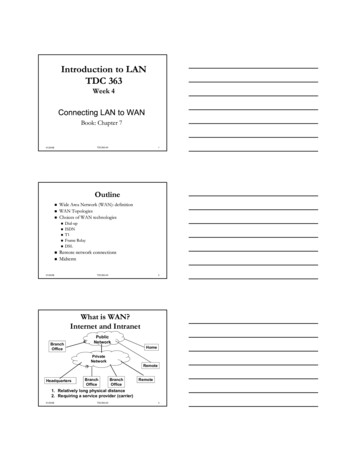
Transcription
www.GetPedia.comMore than 500,000 articles about almost EVERYTHING !!Click on your interest section for more information :Acne Advertising Aerobics & Cardio Affiliate Revenue Alternative Medicine Attraction Online Auction Streaming Audio & Online Music Aviation & Flying Babies & Toddler Beauty Blogging, RSS & Feeds Book Marketing Book Reviews Branding Breast Cancer Broadband Internet Muscle Building & Bodybuilding Careers, Jobs & Employment Casino & Gambling Coaching Coffee College & University Cooking Tips Copywriting Crafts & Hobbies Creativity Credit Cruising & Sailing Currency Trading Customer Service Data Recovery & ComputerBackup Dating Debt Consolidation Debt Relief Depression Diabetes Divorce Domain Name E-Book E-commerce Elder Care Email Marketing Entrepreneur Ethics Exercise & Fitness Ezine Marketing Ezine Publishing Fashion & Style Fishing Fitness Equipment Forums Game Goal Setting Golf Dealing with Grief & Loss Hair Loss Finding Happiness Computer Hardware Holiday Home Improvement Home Security Humanities Humor & Entertainment Innovation Inspirational Insurance Interior Design & Decorating Internet Marketing Investing Landscaping & Gardening Language Leadership Leases & Leasing Loan Mesothelioma & AsbestosCancer Business Management Marketing Marriage & Wedding Martial Arts Medicine Meditation Mobile & Cell Phone Mortgage Refinance Motivation Motorcycle Music & MP3 Negotiation Network Marketing Networking Nutrition Get Organized - Organization Outdoors Parenting Personal Finance Personal Technology Pet Philosophy Photography Poetry Political Positive Attitude Tips Pay-Per-Click Advertising Public Relations Pregnancy Presentation Psychology Public Speaking Real Estate Recipes & Food and Drink Relationship Religion Sales Sales Management Sales Telemarketing Sales Training Satellite TV Science Articles Internet Security Search Engine Optimization(SEO) Sexuality Web Site Promotion Small Business Software Spam Blocking Spirituality Stocks & Mutual Fund Strategic Planning Stress Management Structured Settlements Success Nutritional Supplements Tax Team Building Time Management Top Quick Tips Traffic Building Vacation Rental Video Conferencing Video Streaming VOIP Wealth Building Web Design Web Development Web Hosting Weight Loss Wine & Spirits Writing Article Writing Yoga
Digital FortressDIGITALFORTRESSDan BrownSt. Martin’s PressNew YorkA THOMAS DUNNE BOOK.An imprint of St. Martin’s Press.Digital Fortress. Copyright 1998 by Dan Brown. All rightsreserved. Printed in theUnited States of America. No part of thisbook may be used or reproduced in anymanner whatsoever withoutwritten permission except in the case of brief quotations
embodiedin critical articles or reviews. For information, address St.Martin’s Press,175 Fifth Avenue, New York, N.Y. 10010.Design by Bryanna MillisLibrary of Congress Cataloging-in-Publication DataBrown, Daniel.Digital fortress / by DanBrown. — 1st ed.p. cm.“A Thomas Dunne Book.”ISBN 0-312-20715-8I. Title.PS3552.R685434D54 1998813’.54—dc21 97-33118CIPFor my parents . . .my mentors and heroesA debt of gratitude: to my editors at St. Martin’s Press,Thomas Dunne and theexceptionally talented Melissa Jacobs. To myagents in New York, George Wieser,Olga Wieser, and Jake Elwell. Toall those who read and contributed to the manuscriptalong the way.And especially to my wife, Blythe, for her enthusiasm andpatience.Also . . . a quiet thank you to the two faceless ex-NSAcryptographers who madeinvaluable contributions via anonymousremailers. Without them this book would nothave been written.PROLOGUEPLAZA DE ESPAÑASEVILLE, SPAIN11:00 A.M.
It is said that in death, all things become clear; Ensei Tankadonow knew it was true.As he clutched his chest and fell to theground in pain, he realized the horror of hismistake.People appeared, hovering over him, trying to help. But Tankadodid not want help—itwas too late for that.Trembling, he raised his left hand and held his fingers outward.Look at my hand! Thefaces around him stared, but he couldtell they did not understand.On his finger was an engraved golden ring. For an instant, themarkings glimmered inthe Andalusian sun. Ensei Tankado knew it wasthe last light he would ever see.CHAPTER 1They were in the smoky mountains at their favoritebed-and-breakfast. David wassmiling down at her. “What do yousay, gorgeous? Marry me?”Looking up from their canopy bed, she knew he was the one.Forever. As she staredinto his deep-green eyes, somewhere in thedistance a deafening bell began to ring. Itwas pulling him away.She reached for him, but her arms clutched empty air.It was the sound of the phone that fully awoke Susan Fletcherfrom her dream. Shegasped, sat up in bed, and fumbled for thereceiver. “Hello?”“Susan, it’s David. Did I wake you?”She smiled, rolling over in bed. “I was just dreaming ofyou. Come over and play.”He laughed. “It’s still dark out.”“Mmm.” She moaned sensuously. “Then definitely come over and play. We can sleepin before we headnorth.”David let out a frustrated sigh. “That’s why I’mcalling. It’s about our trip. I’ve gottopostpone.”Susan was suddenly wide awake. “What!”“I’m sorry. I’ve got to leave town. I’ll beback by tomorrow. We can head up firstthing in the morning.We’ll still have two days.”
“But I made reservations,” Susan said, hurt. “Igot our old room at Stone Manor.”“I know, but—”“Tonight was supposed to be special—tocelebrate six months. You do rememberwe’re engaged,don’t you?”“Susan.” He sighed. “I really can’t go intoit now, they’ve got a car waiting. I’ll callyou from theplane and explain everything.”“Plane?” she repeated. “What’s goingon? Why would the university . . . ?”“It’s not the university. I’ll phone and explainlater. I’ve really got to go; they’recalling for me.I’ll be in touch. I promise.”“David!” she cried. “What’s—”But it was too late. David had hung up.Susan Fletcher lay awake for hours waiting for him to call back.The phone neverrang.* * *Later that afternoon Susan sat dejected in the tub. Shesubmerged herself in the soapywater and tried to forget StoneManor and the Smoky Mountains. Where could he be?shewondered. Why hasn’t he called?Gradually the water around her went from hot to lukewarm andfinally to cold. Shewas about to get out when her cordless phonebuzzed to life. Susan bolted upright,sloshing water on the flooras she grappled for the receiver she’d left on the sink.“David?”“It’s Strathmore,” the voice replied.Susan slumped. “Oh.” She was unable to hide herdisappointment. “Good afternoon,Commander.”“Hoping for a younger man?” The voice chuckled.“No, sir,” Susan said, embarrassed. “It’snot how it—”“Sure it is.” He laughed. “David Becker’s agood man. Don’t ever lose him.”“Thank you, sir.”The commander’s voice turned suddenly stern. “Susan,I’m calling because I need youin here. Pronto.”
She tried to focus. “It’s Saturday, sir. we don’tusually—”“I know,” he said calmly. “It’s anemergency.”Susan sat up. Emergency? She had never heard the wordcross CommanderStrathmore’s lips. An emergency? InCrypto? She couldn’t imagine. “Y-yes, sir.”Shepaused. “I’ll be there as soon as I can.”“Make it sooner.” Strathmore hung up.* * *Susan Fletcher stood wrapped in a towel and dripped on theneatly folded clothesshe’d set out the nightbefore—hiking shorts, a sweater for the cool mountainevenings,and the new lingerie she’d bought for the nights.Depressed, she went to her closet fora clean blouse and skirt. An emergency? In Crypto?As she went downstairs, Susan wondered how the day could getmuch worse.She was about to find out.CHAPTER 2Thirty thousand feet above a dead-calm ocean, David Beckerstared miserably fromthe Learjet 60’s small, oval window.He’d been told the phone on board was out oforder, andhe’d never had a chance to call Susan.“What am I doing here?” he grumbled to himself. Butthe answer was simple—therewere men to whom you justdidn’t say no.“Mr. Becker,” the loudspeaker crackled.“We’ll be arriving in half an hour.”Becker nodded gloomily to the invisible voice. Wonderful.He pulled the shade andtried to sleep. But he could only think ofher.
CHAPTER 3Susan’s volvo sedan rolled to a stop in the shadow of theten-foot-high, barbedCyclone fence. A young guard placed his handon the roof.“ID, please.”Susan obliged and settled in for the usual half-minute wait. Theofficer ran her cardthrough a computerized scanner. Finally helooked up. “Thank you, Ms. Fletcher.” Hegave animperceptible sign, and the gate swung open.Half a mile ahead Susan repeated the entire procedure at anequally imposingelectrified fence. Come on, guys . . .I’ve only been through here a million times.As she approached the final checkpoint, a stocky sentry with twoattack dogs and amachine gun glanced down at her license plate andwaved her through. She followedCanine Road for another 250 yardsand pulled into Employee Lot C. Unbelievable, shethought.Twenty-six thousand employees and a twelve-billion-dollarbudget; you’dthink they could make it through the weekendwithout me. Susan gunned the car intoher reserved spot andkilled the engine.After crossing the landscaped terrace and entering the mainbuilding, she cleared twomore internal checkpoints and finallyarrived at the windowless tunnel that led to thenew wing. Avoice-scan booth blocked her entry.NATIONAL SECURITY AGENCY (NSA)CRYPTO FACILITYAUTHORIZED PERSONNEL ONLYThe armed guard looked up. “Afternoon, Ms.Fletcher.”Susan smiled tiredly. “Hi, John.”“Didn’t expect you today.”“Yeah, me neither.” She leaned toward the parabolicmicrophone. “Susan Fletcher,”she stated clearly. Thecomputer instantly confirmed the frequency concentrations inhervoice, and the gate clicked open. She stepped through.* * *The guard admired Susan as she began her walk down the cementcauseway. Henoticed that her strong hazel eyes seemed distanttoday, but her cheeks had a flushedfreshness, and hershoulder-length, auburn hair looked newly blown dry. Trailingherwas the faint scent of Johnson’s Baby Powder. His eyes fellthe length of herslender torso—to her white blouse with thebra barely visible beneath, to her kneelength khaki skirt, andfinally to her legs . . . Susan Fletcher’s legs.
Hard to imagine they support a 170 IQ, he mused tohimself.He stared after her a long time. Finally he shook his head asshe disappeared in thedistance.* * *As Susan reached the end of the tunnel, a circular, vaultlikedoor blocked her way. Theenormous letters read: crypto.Sighing, she placed her hand inside the recessed cipher box andentered her five-digitPIN. Seconds later the twelve-ton slab ofsteel began to revolve. She tried to focus, buther thoughts reeledback to him.David Becker. The only man she’d ever loved. The youngestfull professor atGeorgetown University and a brilliantforeign-language specialist, he was practically acelebrity in theworld of academia. Born with an eidetic memory and a loveoflanguages, he’d mastered six Asian dialects as well asSpanish, French, and Italian.His university lectures on etymologyand linguistics were standing-room only, and heinvariably stayedlate to answer a barrage of questions. He spoke with authorityandenthusiasm, apparently oblivious to the adoring gazes of hisstar-struck coeds.Becker was dark—a rugged, youthful thirty-five with sharpgreen eyes and a wit tomatch. His strong jaw and taut featuresreminded Susan of carved marble. Over sixfeet tall, Becker movedacross a squash court faster than any of his colleaguescouldcomprehend. After soundly beating his opponent, he would cool offby dousinghis head in a drinking fountain and soaking his tuft ofthick, black hair. Then, stilldripping, he’d treat hisopponent to a fruit shake and a bagel.As with all young professors, David’s university salary wasmodest. From time totime, when he needed to renew his squash clubmembership or restring his old Dunlopwith gut, he earned extramoney by doing translating work for government agencies inandaround Washington. It was on one of those jobs that he’d metSusan.It was a crisp morning during fall break when Becker returnedfrom a morning jog tohis three-room faculty apartment to find hisanswering machine blinking. He downed aquart of orange juice as helistened to the playback. The message was like manyhereceived—a government agency requesting his translatingservices for a few hourslater that morning. The only strange thingwas that Becker had never heard of theorganization.“They’re called the National Security Agency,”Becker said, calling a few of hiscolleagues for background.The reply was always the same. “You mean the NationalSecurity Council?”Becker checked the message. “No. They said Agency.The NSA.”“Never heard of ’em.”
Becker checked the GAO Directory, and it showed no listingeither. Puzzled, Beckercalled one of his old squash buddies, anex-political analyst turned research clerk at theLibrary ofCongress. David was shocked by his friend’s explanation.Apparently, not only did the NSA exist, but it was consideredone of the mostinfluential government organizations in the world.It had been gathering globalelectronic intelligence data andprotecting U.S. classified information for over half acentury.Only 3 percent of Americans were even aware it existed.“NSA,” his buddy joked, “stands for ‘No SuchAgency.’ ”With a mixture of apprehension and curiosity, Becker acceptedthe mysteriousagency’s offer. He drove the thirty-seven milesto their eighty-six-acre headquartershidden discreetly in thewooded hills of Fort Meade, Maryland. After passing throughendlesssecurity checks and being issued a six-hour, holographic guestpass, he wasescorted to a plush research facility where he wastold he would spend the afternoonproviding “blindsupport” to the Cryptography Division—an elite groupofmathematical brainiacs known as the code-breakers.For the first hour, the cryptographers seemed unaware Becker waseven there. Theyhovered around an enormous table and spoke alanguage Becker had never heard.They spoke of stream ciphers,self-decimated generators, knapsack variants, zeroknowledgeprotocols, unicity points. Becker observed, lost. They scrawledsymbols ongraph paper, pored over computer printouts, andcontinuously referred to the jumble oftext on the overheadprojector.JHdja3jKHDhmado/ertwtjlw ojr845h0roq vjP duw4h95pe8rtugvjw3p4e/ikkcmffuerhfgv0q394ikjrmg y one of them explained what Becker had alreadysurmised. The scrambledtext was a code—a“ciphertext”—groups of numbers and lettersrepresenting encryptedwords. The cryptographers’ job was tostudy the code and extract from it the originalmessage, or“cleartext.” The NSA had called Becker because theysuspected theoriginal message was written in Mandarin Chinese; hewas to translate the symbols asthe cryptographers decryptedthem.
For two hours, Becker interpreted an endless stream of Mandarinsymbols. But eachtime he gave them a translation, thecryptographers shook their heads in despair.Apparently the codewas not making sense. Eager to help, Becker pointed out thatallthe characters they’d shown him had a common trait—theywere also part of theKanji language. Instantly the bustle in theroom fell silent. The man in charge, a lankychain-smoker namedMorante, turned to Becker in disbelief.“You mean these symbols have multiple meanings?”Becker nodded. He explained that Kanji was a Japanese writingsystem based onmodified Chinese characters. He’d been givingMandarin translations because that’swhat they’d askedfor.“Jesus Christ.” Morante coughed. “Let’s trythe Kanji.”Like magic, everything fell into place.The cryptographers were duly impressed, but nonetheless, theystill made Becker workon the characters out of sequence.“It’s for your own safety,” Morante said. “Thisway,you won’t know what you’re translating.”Becker laughed. Then he noticed nobody else was laughing.When the code finally broke, Becker had no idea what darksecrets he’d helped reveal,but one thing was forcertain—the NSA took code-breaking seriously; the checkinBecker’s pocket was more than an entire month’suniversity salary.On his way back out through the series of security checkpointsin the main corridor,Becker’s exit was blocked by a guardhanging up a phone. “Mr. Becker, wait here,please.”“What’s the problem?” Becker had not expected themeeting to take so long, and hewas running late for his standingSaturday afternoon squash match.The guard shrugged. “Head of Crypto wants a word.She’s on her way out now.”“She?” Becker laughed. He had yet to see afemale inside the NSA.“Is that a problem for you?” a woman’s voiceasked from behind him.Becker turned and immediately felt himself flush. He eyed the IDcard on the woman’sblouse. The head of the NSA’sCryptography Division was not only a woman, but anattractive womanat that.“No,” Becker fumbled. “I just . . .”“Susan Fletcher.” The woman smiled, holding out herslender hand.Becker took it. “David Becker.”
“Congratulations, Mr. Becker. I hear you did a fine jobtoday. Might I chat with youabout it?”Becker hesitated. “Actually, I’m in a bit of a rush atthe moment.” He hoped spurningthe world’s most powerfulintelligence agency wasn’t a foolish act, but his squashmatchstarted in forty-five minutes, and he had a reputation to uphold:David Beckerwas never late for squash . . . class maybe, but never squash.“I’ll be brief.” Susan Fletcher smiled.“Right this way, please.”Ten minutes later, Becker was in the NSA’s commissaryenjoying a popover andcranberry juice with the NSA’s lovelyhead cryptographer, Susan Fletcher. It quicklybecame evident toDavid that the thirty-eight-year-old’s high-ranking positionat theNSA was no fluke—she was one of the brightest women hehad ever met. As theydiscussed codes and code-breaking, Beckerfound himself struggling to keep up—anew and excitingexperience for him.An hour later, after Becker had obviously missed his squashmatch and Susan hadblatantly ignored three pages on the intercom,both of them had to laugh. There theywere, two highly analyticalminds, presumably immune to irrational infatuations—butsomehow, while they sat there discussing linguistic morphology andpseudo–random number generators, they felt like a couple ofteenagers—everything wasfireworks.Susan never did get around to the real reason she’d wantedto speak to DavidBecker—to offer him a trial post in theirAsiatic Cryptography Division. It was clearfrom the passion withwhich the young professor spoke about teaching that he wouldneverleave the university. Susan decided not to ruin the mood by talkingbusiness. Shefelt like a schoolgirl all over again; nothing wasgoing to spoil it. And nothing did.* * *Their courtship was slow and romantic—stolen escapeswhenever their schedulespermitted, long walks through theGeorgetown campus, late-night cappuccinos atMerlutti’s,occasional lectures and concerts. Susan found herself laughing morethanshe’d ever thought possible. It seemed there was nothingDavid couldn’t twist into ajoke. It was a welcome releasefrom the intensity of her post at the NSA.One crisp, autumn afternoon they sat in the bleachers watchingGeorgetown soccer getpummeled by Rutgers.“What sport did you say you play?” Susan teased.“Zucchini?”Becker groaned. “It’s called squash.”She gave him a dumb look.“It’s like zucchini,” he explained,“but the court’s smaller.”Susan pushed him.
Georgetown’s left wing sent a corner-kick sailing out ofbounds, and a boo went upfrom the crowd. The defensemen hurriedback downfield.“How about you?” Becker asked. “Play anysports?”“I’m a black belt in Stairmaster.”Becker cringed. “I prefer sports you can win.”Susan smiled. “Overachiever, are we?”Georgetown’s star defenseman blocked a pass, and there wasa communal cheer in thestands. Susan leaned over and whispered inDavid’s ear. “Doctor.”He turned and eyed her, lost.“Doctor,” she repeated. “Say the first thing thatcomes to mind.”Becker looked doubtful. “Word associations?”“Standard NSA procedure. I need to know who I’mwith.” She eyed him sternly.“Doctor.”Becker shrugged. “Seuss.”Susan gave him a frown. “Okay, try this one . . .‘kitchen.’ ”He didn’t hesitate. “Bedroom.”Susan arched her eyebrows coyly. “Okay, how about this . . ‘cat.’ ”“Gut,” Becker fired back.“Gut?”“Yeah. Catgut. Squash racquet string ofchampions.”“That’s pleasant.” She groaned.“Your diagnosis?” Becker inquired.Susan thought a minute. “You’re a childish, sexuallyfrustrated squash fiend.”Becker shrugged. “Sounds about right.”* * *It went on like that for weeks. Over dessert at all-night dinersBecker would askendless questions.
Where had she learned mathematics?How did she end up at the NSA?How did she get so captivating?Susan blushed and admitted she’d been a late bloomer. Lankyand awkward withbraces through her late teens, Susan said her AuntClara had once told her God’sapology for Susan’splainness was to give her brains. A premature apology,Beckerthought.Susan explained that her interest in cryptography had started injunior high school. Thepresident of the computer club, a toweringeighth grader named Frank Gutmann, typedher a love poem andencrypted it with a number-substitution scheme. Susan beggedtoknow what it said. Frank flirtatiously refused. Susan took the codehome and stayedup all night with a flashlight under her coversuntil she figured out the secret—everynumber represented aletter. She carefully deciphered the code and watched in wonderasthe seemingly random digits turned magically into beautiful poetry.In that instant,she knew she’d fallen in love—codes andcryptography would become her life.Almost twenty years later, after getting her master’s inmathematics from JohnsHopkins and studying number theory on a fullscholarship from MIT, she submittedher doctoral thesis, Cryptographic Methods, Protocols, and Algorithms forManualApplications. Apparently her professor was not the only one whoread it;shortly afterward, Susan received a phone call and a planeticket from the NSA.Everyone in cryptography knew about the NSA; it was home to thebest cryptographicminds on the planet. Each spring, as theprivate-sector firms descended on thebrightest new minds in theworkforce and offered obscene salaries and stock options,the NSAwatched carefully, selected their targets, and then simply steppedin anddoubled the best standing offer. What the NSA wanted, theNSA bought. Tremblingwith anticipation, Susan flew toWashington’s Dulles International Airport where shewas met byan NSA driver, who whisked her off to Fort Meade.There were forty-one others who had received the same phone callthat year. Attwenty-eight, Susan was the youngest. She was alsothe only female. The visit turnedout to be more of a publicrelations bonanza and a barrage of intelligence testing thananinformational session. In the week that followed, Susan and sixothers where invitedback. Although hesitant, Susan returned. Thegroup was immediately separated. Theyunderwent individualpolygraph tests, background searches, handwriting analyses,andendless hours of interviews, including taped inquiries into theirsexual orientationsand practices. When the interviewer asked Susanif she’d ever engaged in sex withanimals, she almost walkedout, but somehow the mystery carried her through—theprospectof working on the cutting edge of code theory, entering “ThePuzzle Palace,”and becoming a member of the most secretiveclub in the world—the NationalSecurity Agency.Becker sat riveted by her stories. “They actually asked youif you’d had sex withanimals?”
Susan shrugged. “Part of the routine backgroundcheck.”“Well . . .” Becker fought off a grin. “What didyou say?”She kicked him under the table. “I told them no!” Thenshe added, “And until lastnight, it was true.”* * *In Susan’s eyes, David was as close to perfect as she couldimagine. He only had oneunfortunate quality; every time they wentout, he insisted on picking up the check.Susan hated seeing himlay down a full day’s salary on dinner for two, but Beckerwasimmovable. Susan learned not to protest, but it still bothered her.I make moremoney than I know what to do with, she thought.I should be paying.Nonetheless, Susan decided that aside from David’s outdatedsense of chivalry, he wasideal. He was compassionate, smart,funny, and best of all, he had a sincere interest inher work.Whether it was during trips to the Smithsonian, bike rides, orburningspaghetti in Susan’s kitchen, David was perpetuallycurious. Susan answered whatquestions she could and gave David thegeneral, unclassified overview of the NationalSecurity Agency.What David heard enthralled him.Founded by President Truman at 12:01 a.m. on November 4, 1952,the NSA had beenthe most clandestine intelligence agency in theworld for almost fifty years. TheNSA’s seven-page inceptiondoctrine laid out a very concise agenda: to protect U.S.governmentcommunications and to intercept the communications of foreignpowers.The roof of the NSA’s main operations building was litteredwith over five hundredantennas, including two large radomes thatlooked like enormous golf balls. Thebuilding itself wasmammoth—over two million square feet, twice the size ofCIAheadquarters. Inside were eight million feet of telephone wire andeighty thousandsquare feet of permanently sealed windows.Susan told David about COMINT, the agency’s globalreconnaissance division—amind-boggling collection oflistening posts, satellites, spies, and wiretaps around theglobe.Thousands of communiqués and conversations were interceptedevery day, andthey were all sent to the NSA’s analysts fordecryption. The FBI, CIA, and U.S.foreign policy advisors alldepended on the NSA’s intelligence to make theirdecisions.Becker was mesmerized. “And code-breaking? Where do you fit in?”Susan explained how the intercepted transmissions oftenoriginated from dangerousgovernments, hostile factions, andterrorist groups, many of whom were inside U.S.borders. Theircommunications were usually encoded for secrecy in case they endedupin the wrong hands—which, thanks to COMINT, they usuallydid. Susan told Davidher job was to study the codes, break them byhand, and furnish the NSA with thedeciphered messages. This wasnot entirely true.Susan felt a pang of guilt over lying to her new love, but shehad no choice. A fewyears ago it would have been accurate, butthings had changed at the NSA. The whole
world of cryptography hadchanged. Susan’s new duties were classified, even to manyinthe highest echelons of power.“Codes,” Becker said, fascinated. “How do youknow where to start? I mean . . . howdo you break them?”Susan smiled. “You of all people should know. It’slike studying a foreign language.At first the text looks likegibberish, but as you learn the rules defining its structure,youcan start to extract meaning.”Becker nodded, impressed. He wanted to know more.With Merlutti’s napkins and concert programs as herchalkboard, Susan set out to giveher charming new pedagogue aminicourse in cryptography. She began with JuliusCaesar’s“perfect square” cipher box.Caesar, she explained, was the first code-writer in history.When his foot-messengersstarted getting ambushed and his secretcommuniqués stolen, he devised a rudimentaryway to encrypthis directives. He rearranged the text of his messages such thatthecorrespondence looked senseless. Of course, it was not. Eachmessage always had aletter-count that was a perfectsquare—sixteen, twenty-five, one hundred—dependingon howmuch Caesar needed to say. He secretly informed his officers thatwhen arandom message arrived, they should transcribe the text intoa square grid. If they did,and read top-to-bottom, a secretmessage would magically appear.Over time Caesar’s concept of rearranging text was adoptedby others and modified tobecome more difficult to break. Thepinnacle of noncomputer-based encryption cameduring World War II.The Nazis built a baffling encryption machine named Enigma.Thedevice resembled an old-fashioned typewriter with brassinterlocking rotos thatrevolved in intricate ways and shuffledcleartext into confounding arrays of seeminglysenseless charactergroupings. Only by having another Enigma machine, calibratedtheexact same way, could the recipient break the code.Becker listened, spellbound. The teacher had become thestudent.One night, at a university performance of The Nutcracker,Susan gave David his firstbasic code to break. He sat through theentire intermission, pen in hand, puzzling overthe eleven-lettermessage:HL FKZC VD LDSFinally, just as the lights dimmed for the second half, he gotit. To encode, Susan hadsimply replaced each letter of her messagewith the letter preceding it in the alphabet.To decrypt the code,all Becker had to do was shift each letter one space forward inthealphabet—“A” became “B,” “B”became “C,” and so on. He quickly shifted theremainingletters. He never imagined four little syllables could make him sohappy:IM GLAD WE METHe quickly scrawled his response and handed it to her:
ID SNNSusan read it and beamed.Becker had to laugh; he was thirty-five years-old, and his heartwas doing backflips.He’d never been so attracted to a womanin his life. Her delicate European featuresand soft brown eyesreminded him of an ad for Estée Lauder. If Susan’s bodyhad beenlanky and awkward as a teenager, it sure wasn’t now.Somewhere along the way, shehad developed a willowygrace—slender and tall with full, firm breasts and aperfectlyflat abdomen. David often joked that she was the first swimsuitmodel he’dever met with a doctorate in applied mathematicsand number theory. As the monthspassed, they both started tosuspect they’d found something that could last a lifetime.They’d been together almost two years when, out of theblue, David proposed to her. Itwas on a weekend trip to the SmokyMountains. They wer
www.GetPedia.com More than 500,000 articles about almost EVERYTHING !! Click on your interest section for more information : Acne Advertising Aerobics & Cardio Affiliate Revenue Alternative Medicine Attraction Online Auction Streaming Audio & Online Music Aviation & Fly











